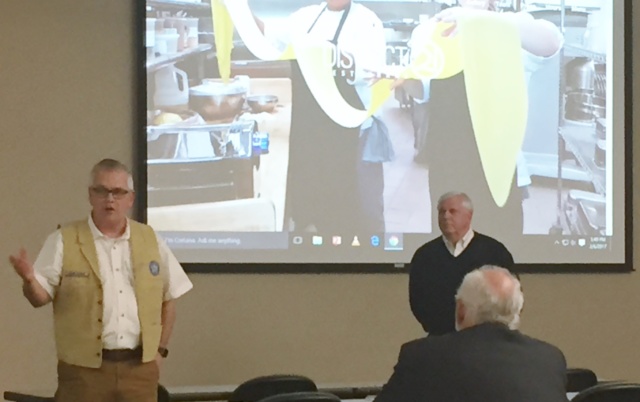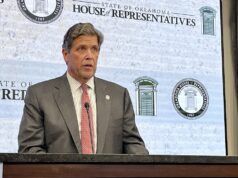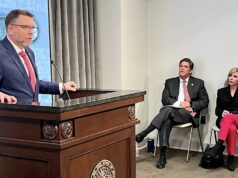
For Judy Cawthon, it was a pre-existing condition that ultimately led to continued depletion of her retirement account. Following the death of her husband, she struggled with being able to secure health insurance. She ended up in the high-risk pool. The payments were overwhelming.
Fortunately, she said she eventually was able to find an employer willing to hire her and provide health insurance. Now, under the Affordable Care Act, others with pre-existing conditions have an opportunity to qualify for coverage because insurance companies are prohibited from denying coverage on that basis.
Cawthon spoke about her experience at a town hall meeting Feb. 6 in Oklahoma City sponsored by the Oklahoma Insurance Department. She voiced concern about the uncertain future of the ACA, especially the restrictions on insurance companies from rejecting people who have been determined to have pre-existing conditions.
“I’m telling you, if that goes away …,” Cawthon said, her voice trailing off after reflecting on her pre-ACA experiences.
Cawthon was among a group of Oklahomans concerned about what a post-ACA environment might look like for those who benefited from the federal law often referred to as Obamacare. Whether it was the level of care, rising costs, pre-existing conditions, public options or the lack of Medicaid expansion in Oklahoma, many of those attending the forum remained skeptical that a complete repeal of the ACA would be a good move.
Canadian health care offers contrast
In the case of insurance agent Tom Schmidt, a heart attack while in Toronto opened his eyes to national discrepancies in health care systems. Schmidt said he felt the emergency care he received in Canada was superior to what is available in the U.S. He pointed to costs as one of the more significant factors in comparing the two systems.
Schmidt said his bill was $30,000 for the nine days he spent going through two heart procedures and recovery. Upon his return to Oklahoma, he started having health problems again. He underwent an outpatient procedure so they could check on his stints. This time, the total was $40,000 for a much less complicated procedure that took about seven to eight hours.
“What is wrong with that picture?” Schmidt asked rhetorically. “My bill was still 1/20th of what it was here (in the U.S.).”
Health care costs have been a significant issue for many Americans, several of whom point to Canada’s system as a more effective option. Canada’s health care system is built around a single-payer, government-run insurance plan with supplementary plans mostly purchased through the private sector. Other than how the system is funded, one of the more significant differences between U.S. and Canadian health care center around cost. In the U.S., physicians make more, the costs of medical equipment are higher, and administrative costs are considerably higher.
Oklahoma Insurance Commissioner John Doak said getting America to a Canadian-style health care system would require a complete overhaul of what exists in the U.S. Michael Rhoads, deputy commissioner for health insurance at the OID, said there are issues that exist with universal health care that might not be as popular in the U.S.
“I suspect that there are more CT scan and MRI units in the city of Oklahoma City than there are in any given province or territory in Canada,” Rhoads said. “There has been much debate over universal coverage — also referred to as single-payer — for six decades. The questions that must be answered are: Would it give Americans better access, would it deliver better quality, and finally, is the U.S. taxpayer willing to pay for it through higher taxes?”
Rejection of Medicaid expansion leaves wife ‘out of luck’
During debate and crafting of the Affordable Care Act in 2009, advocates for a Canadian-style single-payer system did not receive a seat at the bargaining table. Instead, the ACA ultimately focused on insurance reform, developing an insurance marketplace and the expansion of Medicaid to cover lower-income adults.
But Medicaid expansion has been a sore subject for many in Oklahoma because the state — and many others — chose not to participate after the U.S. Supreme Court ruled that it must be optional for states.
Even compromise plans for Oklahoma to draw increased federal funding through Obamacare have failed to gain traction. Gov. Mary Fallin declined to expand Medicaid, and subsequent attempts to help provide health care assistance to those who were falling through the cracks also failed.
Dan McGuire, a resident of central Oklahoma, said that while the ACA had some positives for himself personally, Oklahoma’s decision to reject Medicaid expansion led to his wife being unable to afford her insurance plan. McGuire said she was among those who would have qualified under the expansion. He said she was “out of luck” because of Fallin’s decision, but he said the ACA had at least led to some positive outcomes when people were no longer being denied coverage owing to a pre-existing condition.
“I’ve seen people die because they don’t have health insurance, and that shouldn’t happen,” McGuire said.
A former California resident who attended the town hall, Ramey Barnett moved to Oklahoma to help take care of her parents. Barnett went from having insurance in California to being unable to get it in Oklahoma. She said the difference between the two states was forcing her to make a decision about her future.
“If I can’t get insurance here, I can’t stay here,” Barnett said.
Abuse of the system raises costs
Costs of health care in the U.S. have increased despite predictions of lower premiums, something Rhoads explained was in part a problem that came about thanks to misuse of the system. He said some people were using the marketplace piecemeal rather than enrolling for an entire year, as Congress intended.
“There is abuse of the system,” Rhoads said. “The most egregious is individuals entering or leaving the market based upon their medical needs. There are no requirements for continuous enrollment — although at least nine months of coverage is required under the individual mandate. Criteria under the Special Enrollment Period needs to be tightened to prohibit individuals from letting their policy lapse after receiving coverage for, say, an episode of care and then reentering enrollment at the next medical-need interval.”
Oklahoma’s market riddled with high-risk clients
Many of the concerns at Doak’s forum came from users of the system, but insurance companies want to make sure their voices are heard as well.
Steve Lanier of United Healthcare said insurance companies can’t ignore Oklahoma’s high-risk numbers. He said that makes it tough to offer health insurance plans in Oklahoma.
“No business would stay here under those circumstances,” Lanier said. “It’s just not good sense to stay in this market.”
Oklahoma’s health care problems are significant. Among causes of death, Oklahoma ranks among the nation’s leaders in heart disease, cancer, stroke and diabetes. The health care climate in Oklahoma impacts how insurance companies view the state given that there is only one company — Blue Cross/Blue Shield — offering Oklahomans individual health care insurance through the federal marketplace in 2017. There were five in 2014. Rhoads said under the current climate, it could be worse.
“The number of issuers willing to participate in the exchange has diminished year over year,” Rhoads said. “This is a reflection of the systemic problems associated with the ACA. With no changes to the ACA for policy year 2018, there may or could be no carrier or issuer that would participate in the marketplace. This goes to the need of stabilizing the marketplace — a central theme that regulators have urged Congress to act upon quickly.”
Keep the good, repeal and replace the bad
Representatives from the OID are insistent that changes are coming to the ACA, but they did voice opinions that a full repeal is unlikely.
Doak said he had been asked to make suggestions to political leaders in Washington, D.C., regarding possible changes to the ACA. Rhoads said Congress was focused on eliminating the negative parts of Obamacare and should be moving swiftly to come up with a new health care system.
“The reforms that accompanied the enactment of the law — prohibition of pre-existing conditions, elimination of annual and lifetime benefit maximums, age 26 dependents — are very popular and are expected to remain in a replacement scheme,” Rhoads said.
Potential solutions actively pursued
The OID is working with other state insurance agencies to come up with feasible proposals to create a health care system that works better than the current system. When asked by congressional leadership to offer suggestions, Doak made a number of recommendations for consideration as Congress moves forward, and he blamed the Obama administration in his letter for the health care issues at hand:
Promises by the federal government under Democratic control have placed this country on a very dangerous path that will take time to unwind through a budget-neutral approach. Saddling this burden on the citizens without the funds to back it up is reckless and irresponsible.
The insurance commissioner said the purpose of the town hall meetings was to find out what issues people had and look at potential solutions. Proposals provided to those at the town hall included:
- allowing consumers to buy health insurance across state lines;
- choosing policies that would allow for more health savings accounts to be used with a more affordable, high-deductible health plan;
- and posting medical prices publicly to allow consumers to shop around for best deals.
Meg Freedman addressed the latter proposal and said her organization was already making pricing information available to consumers. Freedman, executive director for the Free Market Medical Association, spoke on the organization’s website about possible changes to the ACA, including discussion of a “free and open market” in President Donald Trump’s executive order.
In addition to the suggestions made by Doak, Rhoads also pointed to healthy incentives through technology as a possibility for those in the marketplace. A scenario with a person using a Fitbit, for example, to track healthy lifestyles in exchange for incentives might be something that could be considered for the future. Rhoads said this is similar to a trend that is becoming more popular among employers.
“There is a growing trend to ‘incentivize’ employees to answer health status questionnaires or a health-risk assessment that serves as a gateway to managing health issues,” Rhoads said. “Participants may receive a financial reward or a premium adjustment.”
Future remains murky without federal guidance
Regardless of which direction America’s health care system ends up going, Doak said it needs to be better than the ACA in its current form. Although the individual market only represents about 6 percent of the health care system, Doak said having more options is integral for the marketplace to work effectively.
“The more choices we have, the better off we are,” Doak said. “The whole point is that what they are doing has more substance and some validity.”
The future of health insurance is murky given the divisions that exist, and the effect on Oklahoma is as divisive as anywhere. But all sides are looking for a quick fix to the problems that exist on some level, and the future needs to be now.
“We do not know the timeline for repeal or replace or repair,” Rhoads said. “What we do know is that issuers must file their 2018 rates by early May 2017, and, in the absence of clear signals from Congress with regard to changes that will stabilize the market going forward, carriers may elect to drop their participation in the marketplace for a period until there is more clarity from the federal level.”





















